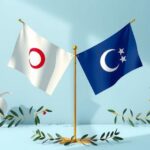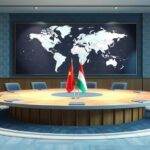Politics
ABDUL LATIF NAZARI, AFGHANISTAN, ASIA, DIPLOMACY, EUROPE, INTERNATIONAL COOPERATION, INTERNATIONAL RELATIONS, ISLAMIC EMIRATE, KABUL, MAT, MINISTRY OF ECONOMY, MINISTRY OF ENERGY AND WATER, NORTH AMERICA, OF ECONOMY, OF ENERGY AND WATER, PANJSHIR, SANCTIONS, SWITZERLAND, U. S, UNITED ARAB EMIRATES, UNITED STATES, US
Nia Simpson
Afghanistan Urges US to Release Frozen Assets Amid Economic Crisis
The Afghanistan Ministry of Economy calls for the release of frozen US assets to aid the country’s economic crisis. The Panjshir to Kabul water project awaits budget approval to address water shortages. Female journalists face access challenges, despite a rise in their numbers. Pakistan extends the deadline for Afghan refugees to return home amid ongoing support discussions.
The Ministry of Economy of Afghanistan has urged the United States to release the nation’s frozen assets, directing those funds to the central bank. Deputy Minister Abdul Latif Nazari called for the international community to lift banking sanctions and increase humanitarian and developmental aid to facilitate Afghanistan’s reconstruction efforts.
For over three and a half years, Afghanistan has been grappling with an economic crisis, exacerbated by the freezing of its central bank assets by the United States and ongoing banking sanctions. Nazari reiterated the need for international support to rebuild the country’s infrastructure and improve its financial situation.
Experts suggest that if the US releases Afghanistan’s assets and lifts economic sanctions, it may enable the country to recover from its profound financial crisis. After the Islamic Emirate assumed control in Afghanistan, the US froze over $9.5 billion of the central bank’s reserves, with $3.5 billion currently under trust for economic aid in Switzerland, while another $3.5 billion remains frozen in US banks.
In a separate development, the Ministry of Energy and Water awaits budget approval for the Panjshir to Kabul water conduit project, aimed at addressing severe water shortages in Kabul. Spokesperson Matiullah Abid indicated that planning phases are complete, and construction will begin upon budget approval.
This ambitious project, covering more than 200 kilometers, will transport water from Bazarak in Panjshir to Tarakhail in Kabul. Residents believe this initiative will significantly alleviate drinking water shortages and improve agricultural potential in the region.
Meanwhile, female journalists in Afghanistan express concerns regarding their lack of access to timely and accurate information. Some report experiencing intimidation from officials when attempting to fulfill their professional roles, compromising their ability to provide diverse perspectives.
Despite these challenges, the number of female journalists has risen to 745, compared to 601 the previous year, indicating some improvement in the media landscape. The Ministry of Information and Culture asserts that it remains committed to the welfare of journalism in the country.
Additionally, Pakistan has extended the deadline for Afghans to return home, initially set for March 31, by one week due to Eid al-Fitr celebrations. The federal government is coordinating efforts to assist Afghan refugees with the repatriation process, ensuring necessary support and resources are in place for those returning to Afghanistan.
In summary, the Afghanistan Ministry of Economy’s appeal to the US to release frozen assets highlights urgent economic needs exacerbated by international sanctions. Concurrently, infrastructure projects like the Panjshir to Kabul water conduit aim to address critical resource shortages, while female journalists navigate challenges to participate in media. Lastly, Pakistan’s extension of repatriation deadlines for Afghan refugees emphasizes ongoing regional dynamics regarding migration and support.
Original Source: www.ariananews.af








Post Comment